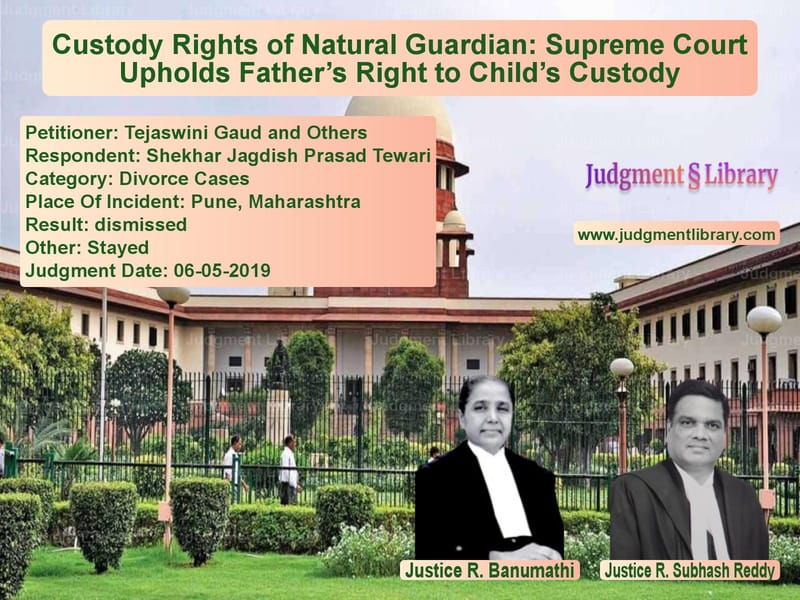Custody Rights of Natural Guardian: Supreme Court Upholds Father’s Right to Child’s Custody
The case of Tejaswini Gaud and Others vs. Shekhar Jagdish Prasad Tewari and Others revolves around a dispute regarding the custody of a minor child following the death of her mother. The Supreme Court ruled in favor of the biological father, affirming his right as the natural guardian under Section 6 of the Hindu Minority and Guardianship Act, 1956. The Court emphasized that the welfare of the child is the paramount consideration in custody disputes.
The case arose after the child’s mother, Zelam, was diagnosed with cancer and later succumbed to her illness. The father, Shekhar Tewari, was hospitalized due to serious health issues, during which time the child was taken care of by the mother’s relatives. Following the mother’s death, the child continued to stay with her maternal family. The father sought custody, but the maternal relatives refused, prompting him to approach the Bombay High Court through a writ of habeas corpus. The High Court ruled in favor of the father, leading to an appeal before the Supreme Court.
Background of the Case
Respondent No.1 (Shekhar Tewari) married Zelam on May 28, 2006. During her fifth month of pregnancy in 2017, Zelam was diagnosed with breast cancer. She gave birth to a girl child, Shikha, on August 14, 2017. In November 2017, Shekhar was diagnosed with Tuberculosis Meningitis and Pulmonary Tuberculosis and was hospitalized. Meanwhile, Zelam and the child were taken by her sister (appellant No.1) and brother-in-law (appellant No.4) to their residence in Mumbai for treatment. Later, in June 2018, they moved to Pune to the residence of appellant No.3 (Zelam’s brother). Zelam passed away on October 17, 2018.
Despite Shekhar’s recovery, the maternal relatives refused to hand over custody of the child. On November 17, 2018, Shekhar filed a complaint at Dattawadi Police Station, Pune, and subsequently approached the Bombay High Court through a writ petition. The High Court ruled that Shekhar, as the natural guardian, was entitled to custody. The maternal relatives then appealed before the Supreme Court.
Petitioner’s Arguments
The maternal relatives, represented by their legal counsel, argued:
- The writ of habeas corpus is not applicable in custody disputes where an alternative legal remedy exists under the Hindu Minority and Guardianship Act, 1956.
- The mother had entrusted the child to them before her death, indicating her desire that they care for the child.
- The child had been with them for over a year and had developed a strong emotional bond, making it in her best interest to remain in their custody.
- While the father was the natural guardian, the welfare of the child, not legal rights, should be the sole consideration in determining custody.
Respondent’s Arguments
The father, Shekhar Tewari, countered:
- Under Section 6 of the Hindu Minority and Guardianship Act, he is the natural guardian and has the legal right to custody.
- The maternal relatives had no authority to withhold the child’s custody from him.
- He had recovered from his illness and was financially stable, working as a Principal Consultant with Wipro Limited.
- Keeping the child away from her father would deprive them of their natural bond and upbringing.
Supreme Court’s Analysis
The Supreme Court examined whether the High Court was justified in issuing a writ of habeas corpus to grant custody to the father. Key legal observations included:
- Section 6 of the Hindu Minority and Guardianship Act, 1956, grants the father the status of the natural guardian unless proven unfit.
- The welfare of the child is paramount and supersedes parental rights in custody matters.
- The maternal relatives had stepped in due to exceptional circumstances when both parents were ill, but their custody did not override the father’s natural right.
- There was no evidence to suggest that the father was unfit or incapable of taking care of the child.
- Allowing the maternal relatives to retain custody could lead to prolonged litigation and instability in the child’s upbringing.
Key Judicial Findings
The Supreme Court ruled:
- The father, as the natural guardian, was entitled to custody of the child.
- The writ of habeas corpus was applicable, as the maternal relatives’ continued custody amounted to illegal detention.
- The custody transfer should be executed in a manner that ensures a smooth transition for the child.
- The maternal relatives were granted visitation rights to maintain the child’s bond with them.
- The appellants must hand over the child’s custody to the father on May 10, 2019, at 10:00 AM.
Conclusion and Impact
The Supreme Court’s ruling reinforces the principle that a natural guardian cannot be denied custody unless proven unfit. This decision sets a significant precedent in child custody matters, ensuring that a father’s right to custody is upheld while considering the best interests of the child.
The judgment also clarifies that writs of habeas corpus can be used in custody disputes when the child’s legal guardian is denied access. This ruling ensures that natural guardians are not deprived of their rights due to temporary custodial arrangements.
Petitioner Name: Tejaswini Gaud and Others.Respondent Name: Shekhar Jagdish Prasad Tewari.Judgment By: Justice R. Banumathi, Justice R. Subhash Reddy.Place Of Incident: Pune, Maharashtra.Judgment Date: 06-05-2019.
Don’t miss out on the full details! Download the complete judgment in PDF format below and gain valuable insights instantly!
Download Judgment: Tejaswini Gaud and O vs Shekhar Jagdish Pras Supreme Court of India Judgment Dated 06-05-2019.pdf
Direct Downlaod Judgment: Direct downlaod this Judgment
See all petitions in Child Custody
See all petitions in Judgment by R. Banumathi
See all petitions in Judgment by R. Subhash Reddy
See all petitions in dismissed
See all petitions in Stayed
See all petitions in supreme court of India judgments May 2019
See all petitions in 2019 judgments
See all posts in Divorce Cases Category
See all allowed petitions in Divorce Cases Category
See all Dismissed petitions in Divorce Cases Category
See all partially allowed petitions in Divorce Cases Category







